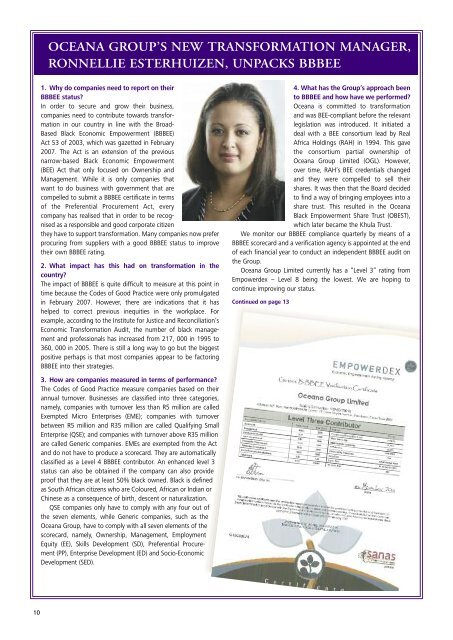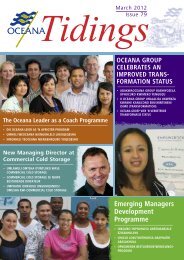April 2011 - Oceana Group
April 2011 - Oceana Group
April 2011 - Oceana Group
Create successful ePaper yourself
Turn your PDF publications into a flip-book with our unique Google optimized e-Paper software.
10<br />
OCEANA GROUP’S NEW TRANSFORMATION MANAGER,<br />
RONNELLIE ESTERHUIZEN, UNPACKS BBBEE<br />
1. Why do companies need to report on their<br />
BBBEE status?<br />
In order to secure and grow their business,<br />
companies need to contribute towards transformation<br />
in our country in line with the Broad-<br />
Based Black Economic Empowerment (BBBEE)<br />
Act 53 of 2003, which was gazetted in February<br />
2007. The Act is an extension of the previous<br />
narrow-based Black Economic Empowerment<br />
(BEE) Act that only focused on Ownership and<br />
Management. While it is only companies that<br />
want to do business with government that are<br />
compelled to submit a BBBEE certificate in terms<br />
of the Preferential Procurement Act, every<br />
company has realised that in order to be recognised<br />
as a responsible and good corporate citizen<br />
they have to support transformation. Many companies now prefer<br />
procuring from suppliers with a good BBBEE status to improve<br />
their own BBBEE rating.<br />
2. What impact has this had on transformation in the<br />
country?<br />
The impact of BBBEE is quite difficult to measure at this point in<br />
time because the Codes of Good Practice were only promulgated<br />
in February 2007. However, there are indications that it has<br />
helped to correct previous inequities in the workplace. For<br />
example, according to the Institute for Justice and Reconciliation’s<br />
Economic Transformation Audit, the number of black management<br />
and professionals has increased from 217, 000 in 1995 to<br />
360, 000 in 2005. There is still a long way to go but the biggest<br />
positive perhaps is that most companies appear to be factoring<br />
BBBEE into their strategies.<br />
3. How are companies measured in terms of performance?<br />
The Codes of Good Practice measure companies based on their<br />
annual turnover. Businesses are classified into three categories,<br />
namely, companies with turnover less than R5 million are called<br />
Exempted Micro Enterprises (EME); companies with turnover<br />
between R5 million and R35 million are called Qualifying Small<br />
Enterprise (QSE); and companies with turnover above R35 million<br />
are called Generic companies. EMEs are exempted from the Act<br />
and do not have to produce a scorecard. They are automatically<br />
classified as a Level 4 BBBEE contributor. An enhanced level 3<br />
status can also be obtained if the company can also provide<br />
proof that they are at least 50% black owned. Black is defined<br />
as South African citizens who are Coloured, African or Indian or<br />
Chinese as a consequence of birth, descent or naturalization.<br />
QSE companies only have to comply with any four out of<br />
the seven elements, while Generic companies, such as the<br />
<strong>Oceana</strong> <strong>Group</strong>, have to comply with all seven elements of the<br />
scorecard, namely, Ownership, Management, Employment<br />
Equity (EE), Skills Development (SD), Preferential Procurement<br />
(PP), Enterprise Development (ED) and Socio-Economic<br />
Development (SED).<br />
4. What has the <strong>Group</strong>’s approach been<br />
to BBBEE and how have we performed?<br />
<strong>Oceana</strong> is committed to transformation<br />
and was BEE-compliant before the relevant<br />
legislation was introduced. It initiated a<br />
deal with a BEE consortium lead by Real<br />
Africa Holdings (RAH) in 1994. This gave<br />
the consortium partial ownership of<br />
<strong>Oceana</strong> <strong>Group</strong> Limited (OGL). However,<br />
over time, RAH’s BEE credentials changed<br />
and they were compelled to sell their<br />
shares. It was then that the Board decided<br />
to find a way of bringing employees into a<br />
share trust. This resulted in the <strong>Oceana</strong><br />
Black Empowerment Share Trust (OBEST),<br />
which later became the Khula Trust.<br />
We monitor our BBBEE compliance quarterly by means of a<br />
BBBEE scorecard and a verification agency is appointed at the end<br />
of each financial year to conduct an independent BBBEE audit on<br />
the <strong>Group</strong>.<br />
<strong>Oceana</strong> <strong>Group</strong> Limited currently has a “Level 3” rating from<br />
Empowerdex – Level 8 being the lowest. We are hoping to<br />
continue improving our status.<br />
Continued on page 13



